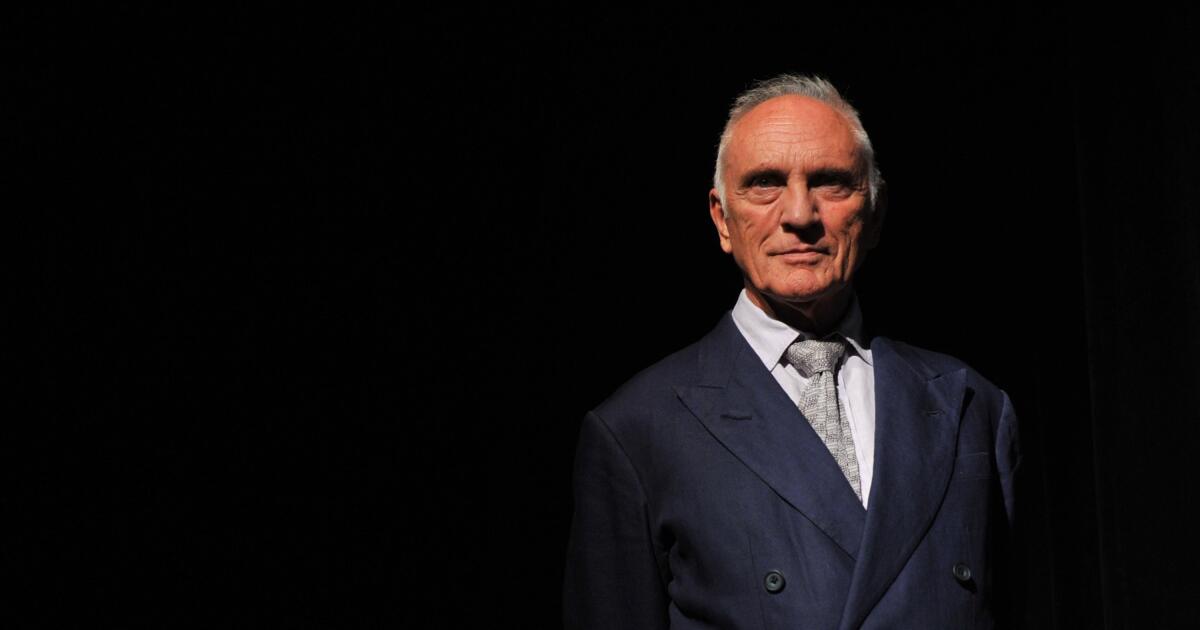Terence Stamp, the prolific English actor who played General Zod in the “Superman” films and earned an Oscar nomination for his portrayal of the title character in “Billy Budd,” has died. He was 87.
Stamp died of undisclosed causes Sunday morning, his family confirmed to Reuters.
“He leaves behind an extraordinary body of work, both as an actor and as a writer that will continue to touch and inspire people for years to come,” the family said in a statement.
Stamp began his acting career onstage in 1960 on London’s West End, but quickly received international attention and critical acclaim with his 1962 portrayal of the title role in Peter Ustinov’s adaptation of Herman Melville’s historical adventure novel, “Billy Budd.”
The humanity Stamp imbued in the tragic, stammering naval vessel crewman established Stamp as a talent to watch — with a Golden Globe Award for best male newcomer to prove it. Still, Stamp didn’t fully break through in Hollywood until 1978 when he embodied the chilling persona of Superman’s arch-nemesis, General Zod, in the first film of what would become a wildly successful franchise. Stamp took on the role again in 1982’s “Superman II.”
Stamp, with his calm demeanor and pale eyes, proved such a successful villain that he feared he was becoming typecast as one. In 1994 he decided to try something radically different when he took on the role of a transgender woman named Bernadette in Stephan Elliott’s now cult-classic film, “Priscilla Queen of the Desert.”
The film marked one of the first times a transgender character was portrayed as a lead in an international film. When the movie premiered at the Cannes Film Festival in May of that year, The Times’ then film critic, Kenneth Turan, interviewed Stamp for a feature. Stamp told Turan that he had been extremely nervous to play the role, but that a good friend encouraged him to take it, saying, “If you don’t start doing parts like this all you can look forward to is playing villains in Hollywood movies for the rest of your life,” and that, Stamp said, “stuck fear and loathing into my heart.”
“Priscilla,” about a group of drag performers on a bus trip to play a show at a resort hotel in the Australian desert, was a critical success, with Turan writing that it, “added some needed life to the Cannes Film Festival scene,” debuting in a “raucous midnight screening.”
In 1999 Stamp teamed up with Peter Fonda in Steven Soderbergh’s crime thriller, “The Limey.”
“When ‘60s icons collide, that should be the pitch for ‘The Limey,’,” noted a feature in The Times about the project. Stamp called his role as a British ex-con named Wilson investigating the death of his daughter in L.A., “the best offer I’ve had in 40 years.”
Stamp and Fonda, old friends who had long wanted to work together, were both experiencing comebacks at the time, with Stamp having just played Chancellor Finis Valorum in the blockbuster, “Star Wars Episode I: The Phantom Menace.”
Terence Henry Stamp was born in London in 1938. His father was part of the Merchant Navy, and was often away for long periods of time. Stamp was raised mostly by his mother, grandmother and a variety of aunts. He loved the movies and idolized Gary Cooper and James Dean.
As a young man he earned a scholarship to Webber Douglas Academy of Dramatic Art — one of Britain’s leading drama schools — and soon began performing at repertory theaters. His roommate at that time was the young actor Michael Caine, and the pair made friends with Peter O’Toole, quickly becoming enmeshed in the good-looking, fast-moving London party scene of the 1960s. Stamp famously dated actor Julie Christie, whom he starred alongside in director Ken Loach’s first feature film, 1967’s “Poor Cow.”
Stamp was known for his intense dedication to craft, particularly his ability to hone in on the psychological underpinnings of a given character. He was known for bringing the same depth of devotion to all his roles, including 1962’s “Term of Trial” alongside Laurence Olivier; William Wyler’s “The Collector” (1965); Joseph Losey’s “Modesty Blaise” (1966); John Schlesinger’s adaptation of Thomas Hardy’s “Far from the Madding Crowd” (1967); and a 50-minute short film by Federico Fellini, “Toby Dammit” (1968), among many others.
In 1999, while filming “The Limey,” he told The Times, “When you’ve had a long career you kind of merge all your great roles together. So I don’t think about being good in an individual thing. I think of the collective total, of working with [William] Wyler and Pasolini … I recently thought to myself, ‘You know, if it had to end now, it would really be OK.’ From ‘Billy Budd’ to ‘The Limey,” no actor could ask for more, so it’s a very great moment for me.”
